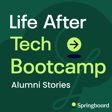
TV Writer to UX Design and Company Founder
Jon Stahl is a recovering TV Writer and current software startup founder who began his career in tech through the Springboard UX/UI Bootcamp.
Jon started in TV and film production in New York before moving to Los Angeles in 2011, where he found work as a Writers’ Assistant and Script Coordinator for several popular TV shows.
In 2021, he pivoted into UX/UI through the Springboard online bootcamp. After graduating, he took several contract roles with entertainment companies like Panavision and WriterDuet to help make their software more user-friendly and accessible.
At the start of 2023, he founded a software startup called Prolog, which aims to modernize the entertainment industry with software for creative professionals.
Questions for John or myself that could be answered on a future episode, please email me at alumnipodcast@springboard.com.
Inspired by this story? Interested in finally taking the plunge by starting your career in tech?
How does $1500 off any Springboard Career Track Course sound?
Use code EPEHT at checkout to save $1500.
Learn more here.
